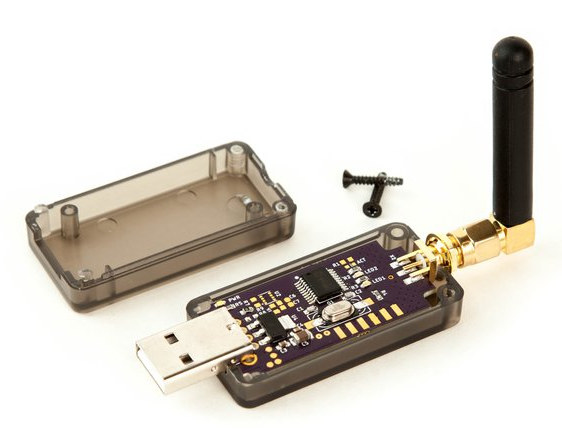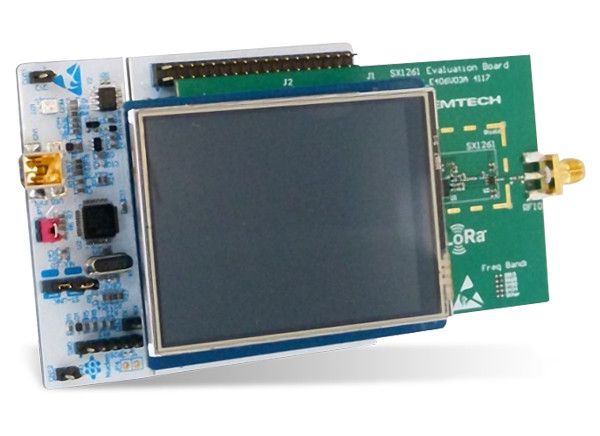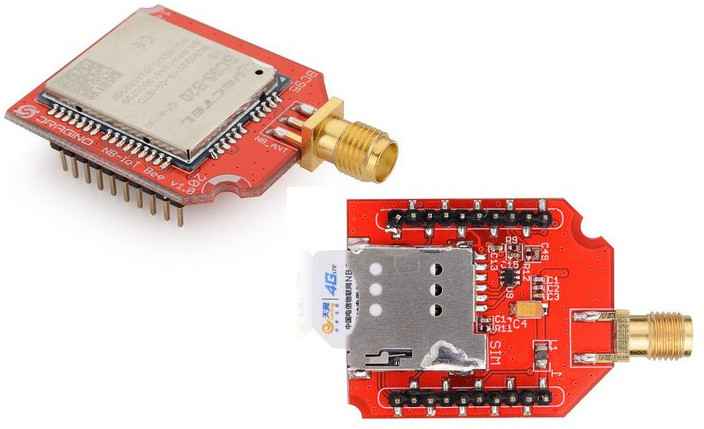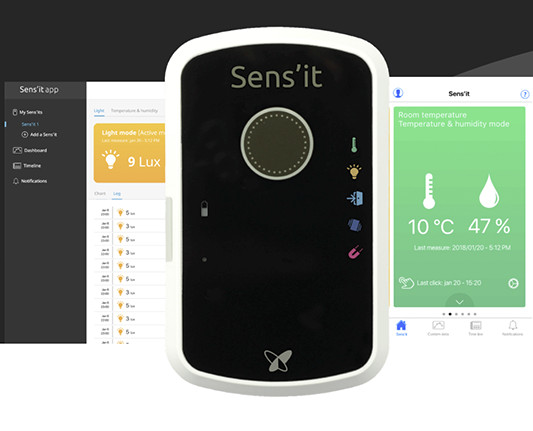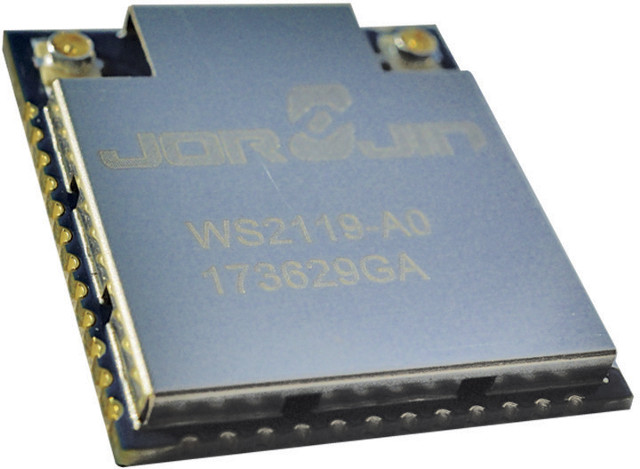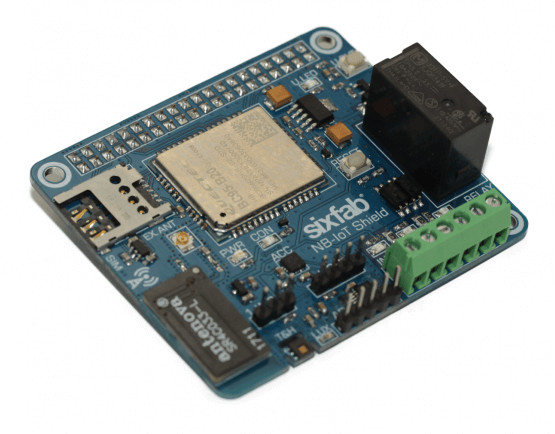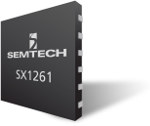We’ve covered plenty of hardware with LoRa radio from gateways, to Arduino shields, tracker boards, and mini PCIe cards, but after reading an article on Time4EE this morning, I realized we never wrote about any LoRa USB stick. LoStik – previoulsy LoRa Stick – is an open source hardware USB dongle based on Microchip RN2903 / RN2483 LoRa module, and offered on CrowdSupply for $39. LoStik specifications: USB – USB 2.0 port LoRa Connectivity Microchip RN2903 – 915 MHz for US, Canada, South America and Australia Microchip RN2483 – 868 Mhz for Europe Receiver Sensitivity – down to -146 dBm TX Power – adjustable up to +18.5 dBm Range – up to 15 km coverage in suburban and up to 5 km coverage in urban areas Misc – 2x user LEDs Power Consumption – 140 ma typical TX, 20 ma idle (with power LED) Dimensions – 80 mm x 25 […]
Semtech SX1261/SX1262 LoRa Development Kit Now Available for $305
Semtech announced SX1261, SX1262 and SX1268 LoRa chips in January as updates to their current LoRa solutions with a lower footprint, better efficiency, and even longer range. Mass production and development kits were expected in March 2018, and today I found out Semtech SX1261/SX1262 development kit is sold on Mouser for $305. The SX126xDVK1CAS kit comes with the following items: 2x SX126xMB1xAS RF modules including an ST Nucleo Mbed board and a touchscreen 2x Mini-USB / USB connection cables 2x 868/915MHz antennas 2x Mini-USB cables 2x touchscreen styluses Read-Me Note The SX1261/SX1262 LoRa Transceivers offer continuous frequency coverage from 150MHz to 960MHz. You’ll find information to get started in the user guide. Basically, the two boards will show a menu on the touchscreen with radio test modes, settings and utilities (e.g. firmware update) as well as two demos: DEMO Ping Pong performs a bidirectional range test between the two radio […]
Dragino NB-IoT Bee is a $23 Xbee Compatible NB-IoT Add-on Board
Several companies are already offering XBee NB-IoT add-on board including Digi International themselves, and SODAQ with their NB-IoT Bee N211 module going for 69 Euros. Dragino NB-IoT Bee is another option for NB-IoT connectivity using Xbee form factor, and the board should be cheaper than most as it goes for $23.00 on Tindie with an external antenna. NB-IoT Bee specifications: NB-IoT module Quectel BC95-B5 for B5:850Mhz, B8:900Mhz, or B20:800Mhz in respectively Nb-IoT Bee QB05, QB08, QB20 models (i.e. one frequency is supported by model) Quectel BG96 for LTE Cat M1 & Cat NB1 & EGPRS in Nb-IoT Bee QG96 model Output Powe – 23dBm Sensitivity – -129dBm Micro SIM Slot Input voltage – 4.5v ~ 5.5V Temperature Range – -40°C ~ +85°C Typical applications for such board include smart metering, facility management services, security & fire alarms, asset tracking, smart city infrastructure and so on. If you are looking specifically […]
Sens’it Discovery is a Sigfox IoT Solution with 6 Sensors
Sigfox has just launched Sens’it Discovery, which they describe as a “end-to-end IoT solution, which aims to accelerate the adoption of the IoT (Internet of things) among business and technical professionals”. The solution is comprised for Sens’it 3 device with 6 sensors, sensit.io application, and Sigfox connectivity. Sens’it 3 hardware specifications: MCU – STM32 micro‑controller Connectivity TI CC1125 radio transceiver Sigfox Ready class 0U Frequencies – 868 to 869.7 MHz, 902 to 908 MHz, or 923.2 MHz (TX) / 922.2 MHz (RX), or 920 to 925 MHz depending on region Transmit Power emission – 14 dBm ERP (RC1), 22 dBm ERP (RC2), 10 dBm ERP (RC3), 22 dBm ERP (RC4) Sensors Thermometer (HTS221) – -40 to 120°C / Accuracy ± 0.5°C Humidity (HTS221) – 0 to 100 / Accuracy ± 3.5% rH (20 to +80% rH) Accelerometer (FXOS8700) – ±2, 4, 8 g / Accuracy 0.244, 0.488, 0.976 mg Magnetometer (FXOS8700) […]
Jorjin WS2118/WS2119 is a Sigfox & Bluetooth LE Module Based on STMicro BlueNRG-1 & S2-LP Chips
Jorjin WS211X is a family of certified dual radio modules combining Sigfox wireless technology thanks to STMicro BlueNRG-1 BLE System-on-Chip (SoC) and Bluetooth Low Energy (BLE) using STMicro S2-LP sub-1GHz RF transceiver. Two models are currently available: WS2118-00 certified for Sigfox regions RCZ1 (Europe, Middle East, South Africa) and RCZ3 (Japan), and WS2119-A0 for regions RCZ2 (USA, Mexico, Brazil) and RCZ4 (Australia, New Zealand, Taiwan, Hong Kong, Singapore, Argentina). Jorjin’s WS211x specifications: Connectivity Bluetooth LE STMicro BlueNRG-1 Arm Cortex M0 @ 16 MHz with 160 kB flash, 24 kB RAM with retention Up to +8dBm BLE RF output power Sigfox STMicro S2-LP sub-1GHz transceiver WS2118-A0 – Up to +16 dBm sub-1GHz RF output power WS2119-A0 – Up to +27dBm sub-1GHz RF output power Receiver sensitivity – Up to -88dBm (BLE) and -130dBm (Sub-1GHz). I/Os – 38-pins package. Security – STSAFE-A1SX for SIGFOX secure element Power Supply – 2.0 to 3.6V Dimension […]
Embedded Linux Conference & IoT Summit 2018 Schedule
The Embedded Linux Conference 2018 and the OpenIoT Summit 2018 will jointly take place next month, on March 12 – 14, 2018 in Portland, Oregon, USA. The former is a “vendor-neutral technical conference for companies and developers using Linux in embedded products”, while the latter is a “technical conference for the developers and architects working on industrial IoT”. The Linux Foundation has already published the schedule, and it’s always useful to learn what will be discussed about even for people who won’t attend. With that in mind, here’s my own virtual schedule with some of the talks I find interesting / relevant to this blog. Monday, March 12 10:50 – 11:40 – Progress in the Embedded GPU Ecosystem by Robert Foss, Collabora Ltd. Ten years ago no one would have expected the embedded GPU ecosystem in Linux to be what it is now. Today, a large number of GPUs have […]
Sixfab Launches Arduino and Raspberry Pi NB-IoT Shields with Four Sensors
SixFab previously introduced a 3G/4G base shield for the Raspberry Pi boards that would take Quectel based mini PCIe card in order to add cellular connectivity to the popular development boards. The company is now back with NB-IoT shields that should better suited to IoT projects with lower hardware and data costs, and support either 40-pin Raspberry Pi boards or Arduino. SixFab Raspberry Pi NB-IoT Shield Specifications & features: Module – Quectel BC95-B20 NB-IoT Module supporting 800MHz frequency (suitable for the European market) Micro SIM card socket, PCB Antenna and u.FL socket for external antenna I/O expansions 4x Channel 12-bit ADC via ADS1015 Relay with optocoupler protection (24V DC, 120-220V AC Switching) 3-pin 1-Wire interface for DS18B20, DHT21, etc… 4-pin I2C interface 3.3V reference voltage Sensors MMA8452Q 3-axis accelerometer HDC1080 temperature sensor (-40 to +125 °C) HDC1080 humidity sensor (0 to 100%) ALS-PT19 ambient light sensor Misc – User button […]
Semtech Improves LoRa Efficiency and Range, Reduces Footprint with SX1261, SX1262, and SX1268 LoRa Chips
LoRa is one of the most popular LPWAN technology deployed around the world with chips made by Semtech, as it allow long range, low power communication at low bitrate, and is especially useful for asset tracking, smart parking, and all sort of remote monitoring of persons (e.g. elderly fall for seniors) or assets (e.g. leak detection). Depending on your applications, i.e. data size and update frequency, a coin cell battery can last up to 10 years The company has now introduced the second generation LoRa technology with three new RF chips that are 45% smaller, reduce power consumption by 50% (4.5 mA) , and extend range by 20%. The new chips also offers a high-power transmit option (+22 dBm), supports FSK modulation for migration to LoRaWAN from legacy protocols, and includes a new spreading factor for dense networks. Full list of new features listed by the company: 50% less power […]


